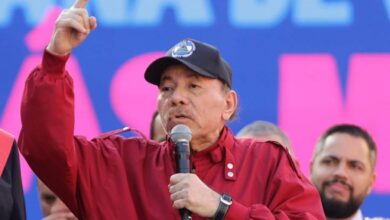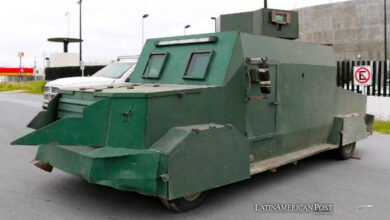The Political Persecution of the Daniel Ortega Regime has led the Country to an Umpteenth Political Crisis.

The arrest by the Nicaraguan Police of the opposition leader Cristiana Chamorro has generated a new episode in the political crisis that the Central American country is experiencing. Photo: TW-chamorrocris
LatinAmerican Post | Santiago Gómez Hernández
Listen to this article
Leer en español: ¿Qué está pasando en Nicaragua?
Nicaragua lives in an authoritarian and totalitarian regime. So says the sanctions of the European Union and the United States and also the criticisms of international organizations such as Human Right Watch and the UN.
Also read: Peru: Fujimorism vs Socialism of the XXI Century?
Capture of the opposition leader
This week, the arrest by the Nicaraguan Police of the opposition leader Cristiana Chamorro has generated a new episode in the political crisis that the Central American country is experiencing.
Nicaragua: La dictadura ha dictado una orden de captura en contra de la candidata de oposición @chamorrocris.
La administración Biden y la Unión Europea deben condenar al unísono este plan para impedir elecciones libres.
Urge una estrategia multilateral para frenar a Ortega. https://t.co/NhIAhxnPSj
— José Miguel Vivanco (@JMVivancoHRW) June 2, 2021
Chamorro, who led the intention to vote within the opposition for the next presidential elections on November 7, was captured for alleged money laundering. In this way, she would be excluded from the next elections. This would result in an easy win for the dictator who seeks his re-election for the position he has held since 2007.
2018 protests
In 2018 Nicaragua experienced its largest protests in recent times. Citizens took to the streets to express their dissatisfaction with the policies of the Ortega regime.
The trigger for the national mobilization was a proposal for social security reforms promoted by Ortega. This institution, which is mainly in charge of the Nicaraguan pension system, had entered an economic crisis since 2013 with a budget deficit that increased every year.
However, as police repression increased, the protests intensified and changed targets. Now they were fighting for protesters and journalists killed at the hands of, according to their families, police forces.
#30deMayo | ????▶ Cientos de madres perdieron a sus hijos en las protestas de 2018. Muchas conformaron la asociación "Madres de Abril", que lucha por encontrar justicia… aún no la consiguen. https://t.co/cnZmTCG0yC pic.twitter.com/jjviZSEAKE
— Nicaragua Investiga (@nicaraguainvest) May 30, 2021
The protests left around 328 dead, more than 1,200 wounded, more than 700 captured, and about 70,000 Nicaraguan refugees abroad. Additionally, international organizations such as the UN ACDH, the Inter-American Commission on Human Rights (IACHR) and the International Group of Independent Experts highlighted the violation of human rights that the country experienced by agents of the State.
Ortega's unpopularity
Despite having been in power for almost 15 consecutive years, Daniel Ortega is going through a popularity crisis. According to a Cid Gallup poll published last year, only 24% of Nicaraguans support his government. This as a consequence of his approach to the Covid-19 pandemic and the violent repression in the protests.
Elections in November
Despite not having the international guarantees of fair and clear elections, the electoral process at the end of the year was presented as a light of hope for the Nicaraguan opposition movements. Many analysts see these upcoming elections as a unique opportunity to remove the Sandinista politician from power due to the recent protests and the health crisis caused by the pandemic.
However, since May, the National Assembly, dominated by the ruling party, began to approve several changes that further benefit the eventual candidacy of Ortega. In the first place, a majority of magistrates related to Sandinismo were appointed to form the Supreme Electoral Council (6 of 7 magistrates). Inhibitions were also approved for opposition candidates and the cancellation of the electoral observation.
In addition to electing the next head of state, about 6.5 million Nicaraguans will elect 90 deputies to the National Assembly and 20 deputies to the Central American Parliament. Currently, of the 92 deputies in the Assembly, 71 are part of the ruling party, also dominating the legislative power with a large majority in a unicameral system.





